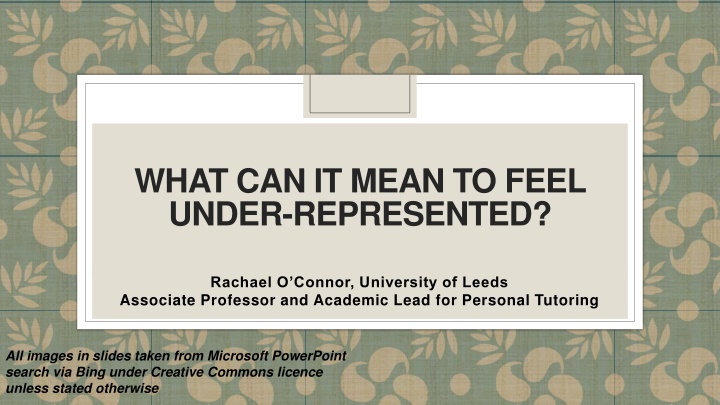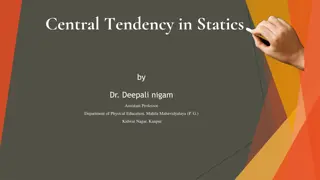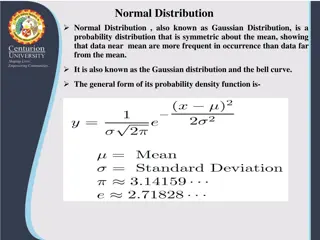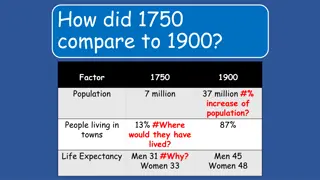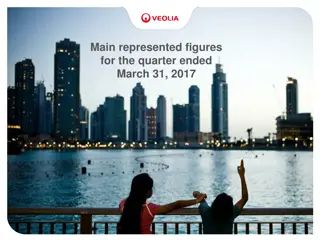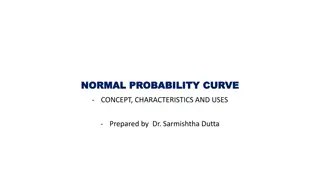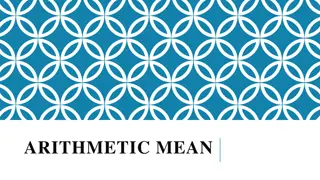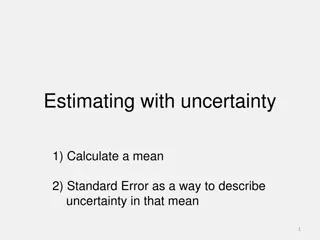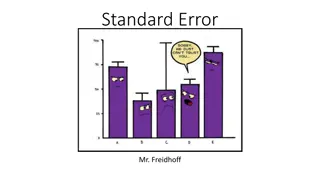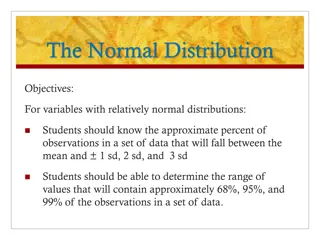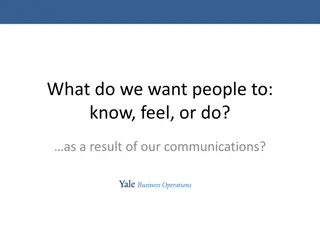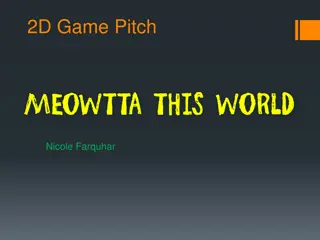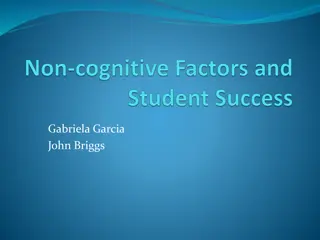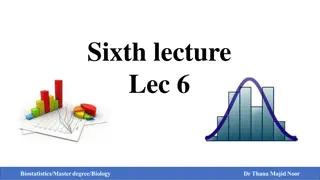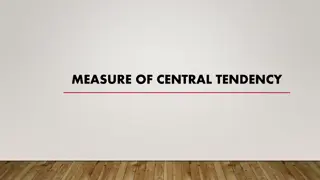WHAT CAN IT MEAN TO FEEL UNDER-REPRESENTED?
Feeling under-represented can impact individuals in academic environments. Reverse mentoring and academic personal tutoring are explored as strategies to address this issue, emphasizing empowerment, reciprocity, and the importance of co-design. The co-design process involves under-represented students in developing solutions for improved representation and support.
Download Presentation

Please find below an Image/Link to download the presentation.
The content on the website is provided AS IS for your information and personal use only. It may not be sold, licensed, or shared on other websites without obtaining consent from the author.If you encounter any issues during the download, it is possible that the publisher has removed the file from their server.
You are allowed to download the files provided on this website for personal or commercial use, subject to the condition that they are used lawfully. All files are the property of their respective owners.
The content on the website is provided AS IS for your information and personal use only. It may not be sold, licensed, or shared on other websites without obtaining consent from the author.
E N D
Presentation Transcript
WHAT CAN IT MEAN TO FEEL UNDER-REPRESENTED? Rachael O Connor, University of Leeds Associate Professor and Academic Lead for Personal Tutoring All images in slides taken from Microsoft PowerPoint search via Bing under Creative Commons licence unless stated otherwise
What is reverse mentoring? a reciprocal and temporally stable relationship between a less experienced mentor providing specific expert knowledge and a more experienced mentee who wants to gain this knowledge characterised by mutual trust and courtesy, it aims at facilitating learning and development of both the mentor and the mentee Source: https://ssir.org/articles/entry/how_reverse_mentoring_can_lead_to_more_equitab le_workplaces Zauchner-Studnicka 2017
WHY REVERSE MENTORING? Building on pilot study It makes me feel empowered and that we can make a difference : Reverse mentoring between international students and staff in legal education (2022) European Journal of Legal Education 3(1), 95-126 Lack of role models important for representation Need to develop understanding of ALL staff not just the work of a few Dual benefit reciprocity: transformational opportunities for mentor and mentee Empowering individuals: being heard, developing identity, increasing self-worth Humanisation: breaking down power, hierarchies and finding common ground Missing piece = co-design and inclusion of student voices and clear goal/outcome to tackle criticisms of reverse mentoring as an intervention
WHY ACADEMIC PERSONAL TUTORING? All of the aforementioned factors may be desirable - authenticity and mattering (Gravett and Winstone, 2022); care (Yale, 2019) All academics as tutors: abstract training may not be sufficient; deeper learning needed APT growing in importance since pandemic? Often badged as student led but how? May be the only meaningful 1-to-1 relationship staff and student have opportunity to create
Phase 1 Co-design staff/student reverse mentoring scheme targeting under-represented students and development of academic personal tutoring (APT) with research team of 15 under-represented students (self-identification) Started with one question: Do you identify as under-represented? Me too
EXAMPLES OF UNDER-REPRESENTATION IN THE STUDENT TEAM between countries & cultures isolation self-doubt middle-class/highly academic language Inadequacy doubts as to my capabilities fears of sounding different stupid needing a job to pay for essentials invisibility South American first language is Spanish find it hard to connect feel invisible woman in STEM ethnicity "others Latino/Hispanic students doesn t identify with binary gender low-income household raised by a single mother completely financially independent no support or 'safety blanket black woman not from the UK upbringing cultural dysphoria hardships British Pakistani child of immigrants students of colour 'posh', white & middle class students out of place I do not fit in worry for fellow black students oldest student on my course feeling out of place mature student outsider transgender man learning difficulties dyslexia ex-offender LGBTQU+ being 'the odd one out working-class disabled student hearing loss & deafness not a typical student
UNDER-REPRESENTATION IN THE TEAM they/them pronouns choose not to drink limits opportunities for socialising History not a very diverse field easy to feel out of place first in my family to go to university disabled working-class (from Dewsbury) mature student commuter student hard to feel like you fit in race religion single household working class background BAME and Muslim returned to study at fifty-nine few opportunities for socialising international student socio-economic background Low Participation Neighbourhood Free School Meal recipient ashamed of my accent lack of understanding of academia & work out of depth struggled with sense of belonging difficult to find people who can relate to me lack of visibility deprived areas Northeast one of few people of colour ethnic minority background South Asian Muslim mis-gendered and wrongly referred to grouped into men & women feel uncomfortable & excluded small & unacknowledged group imposter syndrome Vietnamese Asian students treated as homogeneous history of colonisation difficult to accommodate name incorrect in university email
WELLNESS THROUGH PARTNERSHIP Autonomy Set up of co-creation work: choice, freedom, creativity, self-direction Strength of own voice/views Space to develop identity/values and integrate project values - alignment Relatedness Opportunities to bond, connection through focus of research, internalisation of project s values/aims Competence Recognising value of lived experience, reflecting on skills, having something to contribute, anticipating/recognising impact Level of needs all influenced by own sociocultural context vital to project Deci and Ryan (2000)
Listening to student experiences Did students who self-identify as under-represented experience feelings of wellness (evidenced via autonomy, competence and relatedness) through contributing to co-design of a project seeking to improve experiences of under- represented students?
AUTONOMY it's really nice that we came up with everything it's designed with how we felt about what needed to be changed ... (S10) I don't ever feel like she is imposing an opinion or position on us. It's always like, how do you feel? What do you think? (S7) It was learning like to speak up in a group setting where everyone's, like, really engaged and when what you re saying actually matters (S9; S11)
RELATEDNESS we were able to kind of go beyond the boundaries of just like colleagues and we became friends, and now we're hanging out and that's really nice because I think working on the project, having those in-depth discussions is what allowed that dynamic to build. (S5) being underrepresented, you often feel like invisible or it's like there's no one like you it was just really, really nice to, I guess have that sense of community and feel like, you know, a lot of everything that's been done it's obviously like it s been designed by people who are underrepresented right from the start, like ourselves. And it's made to help people in the same situation as us. (S10) I definitely feel like it's more of a community of underrepresentation because I can see so many other forms of underrepresentation. So it's nice to know you're not just alone in feeling like this at university, many people go through this feeling even if they're not of your background (S13)
COMPETENCE I definitely got better at being able to say I'm not comfortable with this. I ve been feeling confident enough to voice an opinion when it's not just going along with the flow. And I never thought I'd be able to do that. I was really proud of myself for being able to because I know that it's a skill like, you know, it takes a long time to grasp. (S10) the most challenging part for me was to think outside of the box I've never done this [before] I overcame that because I did find very good solutions ... (S4) I'm more capable of things than I initially thought I'm really surprised and happy with myself that I've been able to manage [the project] along with other stress in my personal life (S10)
Phase 2 Run co-designed staff/student reverse mentoring scheme to influence academic personal tutoring policy institutionally
Phase 2 outline: 2 parts Oct 2022 - Jan 2023 intro session and mentoring meetings focused on building authentic relationships, centred around mentor s sense/experiences of under- representation and developing mentee s practice Feb 2023 - Jun 2023 meetings focused on co- developing proposals to develop academic personal tutoring institutionally, building on reverse mentoring learnings
Call to action There is power in creating communities with shared goals/visions More chances to speak about who I am = becoming more comfortable with who I am Sense of belonging and mattering to individual identity (micro) Sense of belonging and mattering to/with staff body (meso) Build communities of under-representation and spaces/platforms for under-represented voices to lead on issues about them/affecting them Sense of belonging and mattering to/with peer community (meso) shared identities
Our words matter! Micro-communities of under-representation are sites of power The more we share and discuss under-representation, the more we celebrate it CHANGE THE NARRATIVE Get students involved in research about them and for them Sense of belonging and mattering to/within institution (macro) Challenge traditions and be willing to try things out putting strategy into action Reverse mentoring provides one vehicle for this https://www.antiwarsongs.org/canzon e.php?id=8105&lang=en
Thank you! Please connect with me Or good old fashioned e-mail: r.e.oconnor@leeds.ac.uk @RachaelOConnor4
Further resources relating to my work Challenging the traditional : how micro-communities can bring about big change https://spotlight.leeds.ac.uk/world-changers/challenging-the-traditional/index.html It makes me feel empowered and that we can make a difference Reverse mentoring between international students and staff in legal education https://ejle.eu/index.php/EJLE/article/view/45 Supporting students to better support themselves through reverse mentoring: the power of positive staff/student relationships and authentic conversations in the law school https://www.tandfonline.com/doi/full/10.1080/03069400.2023.2206738 Exploring academic personal tutoring in partnership with under-represented students https://teachingexcellence.leeds.ac.uk/exploring-academic-personal-tutoring-in-partnership-with-under- represented-students/ LawCare and University of Leeds reverse mentoring project https://www.lawcare.org.uk/latest-news/reverse- mentoring- project/#:~:text=This%20scheme%20will%20see%20aspiring,wellbeing%20within%20participant%20law%20fir ms Blogs on Times Higher Education website: https://www.timeshighereducation.com/campus/authors/rachael- oconnor TedX talk: https://www.youtube.com/watch?v=cVRcnwbo3kg
